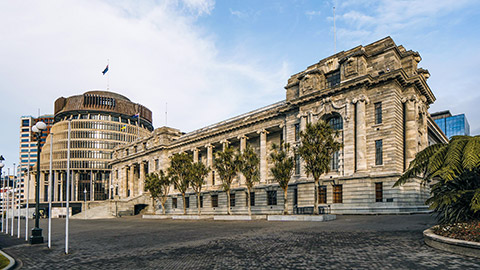Government agencies and community groups form a part of our community when it comes to raising tamariki. They provide the regulations for the policies and procedures that we have in place to ensure the health, safety, and wellbeing of the tamariki and their extended families. They are also there to provide support to the ECE sector.
Government agencies are involved with the development of policy and monitoring of local government. Their roles range from strategic development and policy, regulation, and monitoring, to handling complaints about the activities and operations of local government.

Most of the governmental agencies are operated from New Zealand's capital city, Wellington, along with the iconic Government building — the Beehive.
Each of the agencies provides legal documents to ensure the protection, safety, health, and continued practices, within the community.
Select the (+) for each agency below to learn about their role in New Zealand education.
The Ministry of Education (MoE) is the Government's lead advisor on the New Zealand education system. Their purpose is to ensure that processes and procedures are in place in early childhood centres right across the country that ensure the safety and security of the students it serves. The MoE provides a set of legal guidelines and assessment criteria to ensure that children’s well-being is being nurtured and cared for in all ECE settings.
Examples of legal guidelines:
- New Zealand early childhood curriculum
- Early childhood regulations
- Home-base, centre-based, and hospital-based licensing criteria
The Ministry of Education provides strategies and offers support to providers that are involved with education.
What they do:
- Support teachers, students, and their families to raise educational achievement in schools
- Administer funding for preschool services, schools, and tertiary providers
- Provide special education services
- License early childhood education providers
- Help schools function by providing property, transport, and information technology services
- Gather and analyse data to inform decision-making in the education sector
The impacts that the Ministry of Education has on early childhood education and particularly the home-based setting, are that they:
- provide educators and management support to ensure children’s well-being is nurtured
- ensure young children are learning self-help skills
- champion children’s voices
- provide the guidelines, through the Ministry of Education, to make sure quality and professional practices are taking place in the home base
- provide educators and management legal documents to support their vision of supporting young children.
Use these links to get a thorough picture of what this agency provides.
The Ministry works across the health sector to deliver better health outcomes for New Zealanders.
Purpose and role
The Ministry of Health seeks to improve, promote and protect the health and wellbeing of New Zealanders through:
- its leadership of New Zealand’s health and disability system
- advising the Minister of Health, and government, on health and disability issues
- directly purchasing a range of national health and disability support services
- providing health sector information and payment services for the benefit of all New Zealanders.
Read more at The Ministry of Health website.
The Early Childhood Council (ECC) was formed in 1990 from the amalgamation of the Licensed Childcare Centres Federation and the Associated Childcare Council. It became an officially incorporated society in 1991. The ECC is governed by its constitution, which provides for an Executive Committee elected by members.
The ECC's primary purpose is to:
- represent the interests of independent early childhood centres
- promote the provision of quality early childhood education services.
Benefits and services
All ECE centres in Aotearoa are encouraged to register with the service. They provide a range of benefits and services to its members, including:
- a range of goods and services from preferred suppliers, including finance, accounting and taxation services, audit services, insurance services, e-portfolio services, energy supply, office and teaching supplies, hygiene and cleaning supplies, and technology solutions (photocopiers, printers, etc)
- regular news updates
- comprehensive information and help library on every topic from setting up a centre, managing, marketing, compliance and much, much more
- pver 200 freely downloadable tools and templates, updated annually, to help your centre operate successfully and comply with the many requirements
- the quarterly Swings & Roundabouts magazine
- a range of surveys on topics of importance to the sector so your view can be heard
- an invitation to the Early Childhood Council Annual Conference, attracting hundreds of member and non-member participants
- access to free 15-minute employment law and accounting helplines
- a comprehensive selection of PD workshops for management and staff
- information and PD webinars.
Do a deep dive of who they are and what they provide at the Early Childhood Council website.
ERO is the New Zealand government’s external evaluation agency. They evaluate and report on the education and care of learners in schools, kura, kohanga reo, puna reo, and early childhood services.
Parents, teachers, early childhood education managers, school principals, trustees, and government policymakers use ERO’s reports to look for ways they can improve compliance, which in turn improves the experience, and hopefully, outcomes of students.
The Chief Executive, who is also the Chief Review Officer (CRO), assigns approximately 150 review officers to undertake reviews across the country. The reviews are thorough and usually take 3 or 4 days to complete. The school then waits for their report. The CRO’s functions and powers are described in The Education and Training Act (The Act) 2020, Part 5, subpart 3 and Part 6, subpart 6.
The Act gives the CRO the power to initiate reviews, investigate, report, and publish findings on the provision of education to young New Zealanders.
Learn more on the ERO website.
This agency sits inside the Te Kāwanatanga o Aotearoa | New Zealand Government
They:
- promote the use of Māori as a living language
- promote standards of writing and spoken Māori
- administer exams for people wanting formal certification as translators and interpreters
- expand the Māori language.
Explore more on the Te Taura Whiri i te Reo Māori website.
NZEI Te Riu Roa members work in every community in New Zealand, leading and advocating for quality public education.
They are made up of the 46,000 principals, teachers and support staff who work in primary, area, and secondary schools and early childhood centres, special education, and school advisory services. They come together as NZEI Te Riu Roa - New Zealand’s largest education union — a Treaty based organisation and a powerful advocate for quality public education. They claim to have the most important job in New Zealand — educating for the future.
As the professional voice of New Zealand educators, they focus on continually improving the high-quality education our schools and centres offer our children. As the industrial voice of educators, they have a commitment to securing the best employment terms and conditions possible for all members.
"We are the collective voice of the profession." -- Te Riu Roa
Visit the website of Te Riu Roa to learn more.
Activity - Getting to know Governmental Agencies
Use this template to complete the activity and save it to use as a resource for your assessments. Bring in the completed activity for a class discussion with your tutor.
- For each agency, enter their key priorities and the impact on the ECE sector in New Zealand.
- Select one of them, and describe how, as a new ECE educator, you can use that resource to improve the conditions of your work or the work you are doing with tamariki.

Community services provide services within the community that society has easy access to and serve a particular need. These organisations offer their services for the purpose of helping people. For example, there are clinics for physical health, telephone support for mental health, agencies that provide financial support and advice, and services for new and young parents to name just a few.
There are a lot of different community services in every area of New Zealand that are there to support and offer guidance to all Kiwis. Let’s take a look at a few that fall within the early childhood community.

Many places support community gardens where people can gather, share gardening tips, and show off their haul. When children are included in these activities they learn about the world around them and their place in it.
As with the Government Agencies, we'll introduce you to some of them and then ask you to do some of your own review and analysis. If you have other community service groups in mind that you would like to investigate for the following activity, run it past your tutor to make sure it aligns with the sector and you can choose that service instead. Try to select a service that is active in your local community or area.
Select the (+) sign to view information about each agency.
This agency is run as a charity and is Aotearoa’s largest support service for the health and wellbeing of tamariki under-five and their whānau. As a provider of Well Child Tamariki Ora, they conduct in-home well-baby visits. They also offer pre-natal and post-natal classes, vaccinations, and they track the developmental progress of the child in order to raise any concerns that may be present so the parent can seek further healthcare from their family doctor.
Find out more at Plunket's website.
The Well Child Tamariki Ora programme is a series of health visits and support that are free to all families for children from around 6 weeks up to 5 years of age.
These visits cover:
- child growth and development
- family health and wellbeing
- immunisation information
- oral health (teeth and gum) checks
- early childhood education
- vision (sight) and hearing
- health and development checks for learning well at school.
You can find more information at the Ministry of Health.
There is nothing quite like the new baby phase for it's incredible ups and downs. Parent Groups offer a service to new parents that allow for sharing of joys and challenges. When the baby is brand new, groups for new mothers and fathers focus on mental support and strategies for this time period. As the baby grows into a toddler and then young child, a parent may choose those that provide entertainment and community for the children.
A service that enables people to gather together and sing or play is an ideal community service because it promotes so many angles of healthy child development. Weekly sessions are often full of songs and rhymes, actions, and movement. They are designed to engage the caregiver and child.
One such group is mainly music & mainly play.
The Fono provides affordable services including medical, dental, social, pharmacy, health promotion, education, and Whānau Ora spread across six locations in Auckland and Northland.
The Fono's focus is delivering positive health outcomes for the people who need it the most — fostering well, safe, vibrant, and informed communities. It is the result of agreements between The Fono Trust and Pasifika Horizon Healthcare (2013) and The Peoples Centre Trust (2012). By pooling resources and combining organisations, Auckland communities have more readily accessible quality health services available.
The Fono's community focus:
"We will match our delivery to the cultural needs of our community, underpinned by care"
Explore the website of The Fono.
This agency is driving change to improve inclusion, belonging, and wellbeing in refugee-background and migrant communities.
Their Safari Project supports refugee and migrant background mothers and children (0-5 years old) by providing a fun learning environment for both parents and children. As children learn through play, parents gain new skills, new social support networks, and new information about Aotearoa and the services that are available to them locally and nationally. Safari has helped prepare children and mothers for both school and living a meaningful life in their new home.
Safari playgroups are located across Auckland and run multiple times a week.
Community groups can also be Church groups, Youth groups, support groups or any other group that offers a service in a community.
Activity - Getting to know Community Services
Use this template to complete the activity and save it to use as a resource for your assessments. Bring the completed template into class for discussion with your tutor and peers.
- For each service, enter their key priorities and who will access the service and the impact on the ECE sector in New Zealand.
- Select one of them, and imagine that you have someone that you think needs the service. Describe how you would offer advice and encouragement to use the service.

